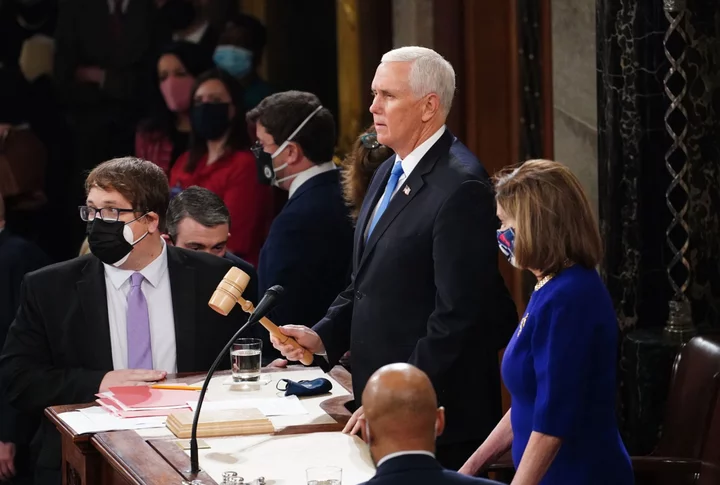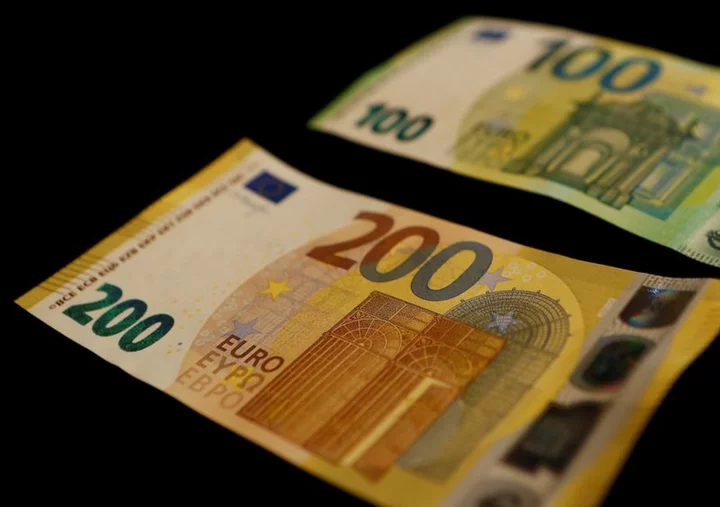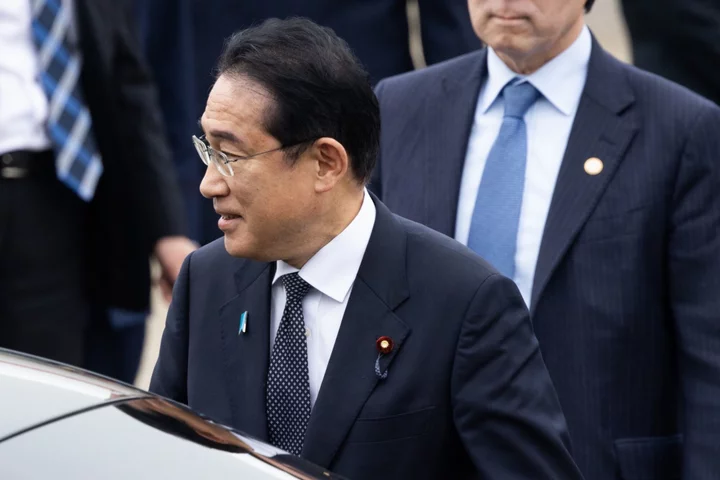Donald Trump’s attempt to strong-arm Mike Pence into refusing to certify the result of the 2020 election wasn’t just an unseemly pressure campaign that put his vice president’s life at risk, it was the linchpin of a scheme to defraud America, according to US prosecutors.
A grand jury in Washington returned an indictment Tuesday in Special Counsel Jack Smith’s investigation charging Trump with conspiracy to reverse his election loss through deceit and false claims of voter fraud. The indictment relies heavily on Trump’s treatment of Pence, who was forced to flee the Senate chamber in the Capitol on Jan. 6, 2021, as a mob of Trump supporters attempted to prevent Pence’s certification of Joe Biden’s victory.
Pence, derided by Trump as “too honest” in a phone call cited in the indictment, resisted the pressure from Trump and carried out his ceremonial role, thwarting the former president’s alleged plot to stay in office.
The indictment drew Pence’s strongest rebuke of Trump yet. The Constitution “is more important than any one man’s career,” Pence said in a statement. “Anyone who puts himself over the Constitution should never be President of the United States.”
After testifying before the grand jury that handed down the indictment, the former vice president is now poised to be a star witness in his former boss’s criminal trial, even as both men seek the Republican nomination for the 2024 election. Pence also has “contemporaneous notes” of conversations with Trump, according to the indictment, which are likely to be key evidence in a trial.
Smith shows in the indictment how Pence became the focus of Trump’s ire as Jan. 6 approached. Pence — like judges in dozens of election cases across the US — didn’t accept claims by Trump and his allies that the former president was a victim of massive voter fraud. Pence also disagreed with Trump’s contention that a vice president had authority to decline to certify such results.
Read more: What Trump’s Many Legal Perils Mean for His 2024 Bid: QuickTake
In the hours before the insurrection, Trump told his supporters at a rally near the White House to march to the Capitol and convince Pence to do the “right thing.”
Trump “gave false hope that the Vice President might change the election outcome, and directed the crowd in front of him to go to the Capitol as a means to obstruct the certification and pressure the Vice President to fraudulently obstruct the certification,” according to the indictment.
But Trump knew Pence didn’t have the authority, according to the indictment. Trump was advised by his lawyers, the Justice Department and the former vice president that such a plan had no merit.
“Did you hear that? Even your own counsel is not saying I have the authority,” Pence told Trump in resisting a proposal to return the question of the electors back to the states, according to the former vice president’s notes cited in the indictment. “That’s ok. I prefer the other suggestion” of the vice president rejecting the electors unilaterally, Trump responded.
On Dec. 25, 2020, when Pence called Trump to wish him a Merry Christmas, Trump “quickly turned the conversation to January 6” and urged the vice president to reject electoral votes on that day, according to the indictment. Pence pushed back, telling Trump, “I don’t think I have the authority to change the outcome.”
Trump revisited the issue on New Year’s Day, the government alleges, when he “berated” Pence for opposing his plan and told him, “You’re too honest.”
The indictment makes clear the former president’s persistence on Jan. 6, 2021:
- 1:00 a.m. — Trump sends a tweet falsely claiming that if Pence “comes through for us” then “we will win the Presidency.” Trump also says “Many States” want to decertify Biden’s victory because legislators didn’t approve mail-in voting. “Mike can send it back!”
- 8:17 a.m. — Trump falsely claims in another tweet that “States want to correct their votes, which they now know were based on irregularities and fraud” and says that all Pence has to do “is send them back to the States, AND WE WIN. Do it Mike, this is a time for extreme courage!”
- 11:15 a.m. — Trump called Pence again pressuring him to reject or return Biden’s legitimate electoral votes. Pence again refused. “Immediately after the call, the defendant decided to single out the Vice President in public remarks he would make within the hour,” adding language to his speech that advisors had previously removed.
- 2:24 p.m. — Trump, left alone in a dining room, issued a tweet intended to further delay and obstruct the certification: “Mike Pence didn’t have the courage to do what should have been done to protect our Country and our Constitution.”
- One minute later, at 2:25 p.m., the US Secret Service was forced to evacuate Pence to a secure location.
- Throughout the afternoon — protesters could be heard chanting: “Hang Mike Pence!”; “Where is Pence? Bring him out!”; and “Traitor Pence!”
Pence stood as the last line of defense in Trump’s monthslong pressure campaign that extended to state lawmakers, election officials and the Justice Department. For example, prosecutors say that Trump tried to get the Justice Department “to make knowingly false claims of election fraud” in swing states to give his agenda “the backing of the federal government.” Trump also tried to give the Pence plan cover by arranging for slates of fake presidential electors to be named in swing states.
In his book, So Help Me God, Pence wrote about a final call he received from Trump before the assault on the Capitol and how Trump “laid into me” for not being willing to overturn the election.
“‘You’ll go down as a wimp,’ Trump said, adding, ‘If you do that, I made a big mistake five years ago,’” Pence wrote in his book, referring to Trump’s decision to pick him as his running mate.
(Adds details of Trump’s alleged pressure on Pence below the second photo. An earlier version of this story was corrected to show that Pence fled the Senate chamber but not the Capitol complex.)
Author: Erik Larson, Sabrina Willmer and David Voreacos









